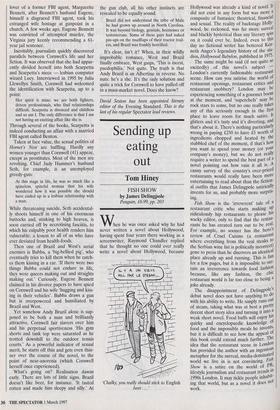Sending up eating out
Tom Hiney
FISH SHOW by James Delingpole Penguin, £6.99, pp. 203
hen he was once asked why he had never written a novel about Hollywood, having spent four years there working as a screenwriter, Raymond Chandler replied that he thought no one could ever really write a novel about Hollywood, because `Chalky, you really should stick to English beer . . Hollywood was already a kind of novel. It did not exist in any form but was more a composite of fantasies; theatrical, financial and sexual. The reality of backstage Holly- wood, he reckoned, was far more surreal and blackly hysterical than any literary spin on it could ever be. Indeed, even to this day no fictional writer has bettered Ken- neth Anger's legendary history of the stu- dios, Hollywood Babylon, published in 1975. The same might be said (if not quite so excitedly) of this novel's subject London's currently fashionable restaurant scene. How can you satirise the world of restaurant openings, restaurant critics and restaurant snobbery? London may be experiencing something of a gourmet boom at the moment, and `superchefs' may be rock stars to some, but no one really takes any of this seriously enough in the first place to leave room for much satire. It glitters and it's tasty and it's diverting, and that's about it. There's nothing particularlY wrong in paying £250 to have £5 worth of ingredients chopped and heated by the stubbled chef of the moment, if that's how you want to spend your money (or your company's money), but we do not really require a writer to spend the best part of a novel pointing out how vain it all is. A canny survey of the country's over-priced restaurants would really have been more entertaining to read about than the fiction- al outfits that James Delingpole satirically invents for us, and probably more surpris- ing. Fish Show is the 'irreverent' tale of a restaurant critic who starts making uP ridiculously hip restaurants to please his wacky editor, only to find that the restau- rants he has created turn out to be real. For example, no sooner has the hero's review of Cruel Cuisine (a restaurant where everything from the veal steaks W the Serbian wine list is politically incorrect) gone to press than he discovers an identical place already up and running. This is fun for a few pages, but it is impossible to sus- tain an irreverence towards food fashion because, like any fashion, the chic restaurant world is far too close to being a joke already. The disappointment of Delingpole's debut novel does not have anything to do with his ability to write. He simply runs out of steam, taking what was at best a pretty decent short story idea and turning it into . a weak short novel. Food buffs will enjoy his quirky and encyclopaedic knowledge of food and the impossible meals he invents, but it is difficult to see how the appeal of this book could extend much further. The idea that the restaurant scene in London has provided the author with an ingenious metaphor for the surreal, media-dominated world we live in is not convincing. Fish Show is a satire on the world of PR, lifestyle journalism and restaurant trends .111 1990s London. It may tickle people in ing that world, but as a novel it does not work. habit


























































 Previous page
Previous page